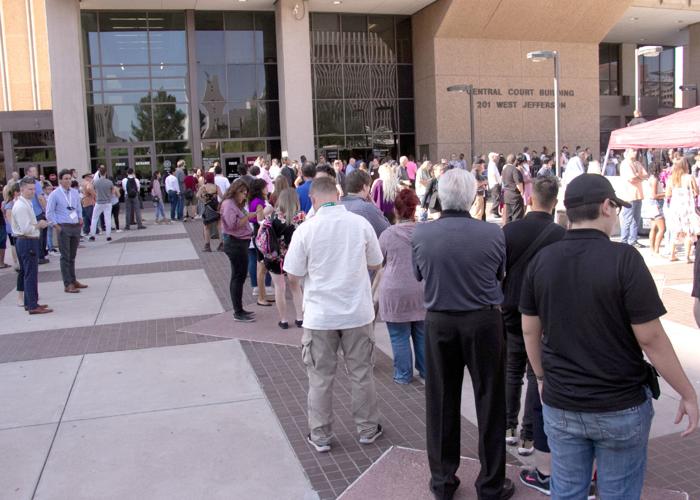Years of lobbying, years of legislative work led to the unusual scene at a Phoenix hearing room this week.
On Monday, more than 800 petition circulators showed up for the first day of a trial to determine whether the Clean Energy Initiative, now numbered Proposition 127, can appear on Arizona ballots this November. But it was more than just a procedure to check the validity of signatures on petitions.
It was the culmination of years of efforts by some members of the state Legislature and business interests such as the Arizona Chamber of Commerce and Industry to crack down on state residents who use Arizona’s constitutional provisions allowing for citizen initiatives.
Making laws has long been a rich-folks’ game: You have to have money to hire lobbyists to get your bill passed. And they like it that way.
Now, initiatives, too, seem not so much like the citizen-driven processes envisioned in the constitution but battles among the wealthy and powerful in a different venue.
The petition circulators showed up in Phoenix because an interest group, Arizonans for Affordable Electricity, had subpoenaed them to appear. For those who didn’t show up, a 2014 law dictates that the signatures that circulator collected can be thrown out. This was one of the first recent laws to successfully restrict initiatives.
And who is Arizonans for Affordable Electricity? It is a political arm of Arizona Public Service Co., the state’s largest utility, and its parent company, Pinnacle West. Newly released financial reports show that the utility has put more than $11 million into the group. That’s why they were able to actually find 900 or so petition circulators and subpoena them.
“They were obviously counting on stifling the initiative by flooding the system with subpoenas,” former Arizona Corporation Commissioner and solar supporter Kris Mayes told me. “What’s to stop this in the future? It’s really dangerous and a little depressing.”
Normal people, citizens pushing an initiative, would never be able to ensure that their petition circulators showed up in response to these subpoenas, thereby ensuring their signatures aren’t thrown out. But the backers of the Clean Energy for a Healthy Arizona Initiative are not normal citizens. In fact, they are basically one person: Tom Steyer, the California billionaire.
The Steyer-funded group NextGen Climate Action has put in all but $4.88 of the $8.3 million donated to the Clean Energy for a Healthy Arizona campaign.
Because they were that well-funded, they were prepared to fight Arizona Public Service. They ensured the circulators’ travel was paid for and that they received lunch while waiting around at the trial, campaign spokesman D.J. Quinlan told me.
Imagine if some ad-hoc citizens’ group tried to wrangle its petition circulators to Phoenix and feed them. Nope, it took big money to go into this fight.
That was also true because of an even bigger change in state laws on initiatives, a set of 2017 bills sponsored by Rep. Vince Leach of SaddleBrooke. The most important of those bills required that petitions adhere to “strict compliance” rather than “substantial compliance” in order to be considered valid. In other words, they couldn’t be missing a county name, or a notary stamp, or have any other relatively minor mistake, or they would be considered invalid.
Attorney Roopali Desai led a lawsuit challenging the constitutionality of the strict-compliance law last year, but a judge ruled it was not ripe. No one had been injured yet. Now Desai says the accumulation of restrictions makes it hard for normal people to defend their initiatives.
“What this shows is the millions of dollars it takes to defend these cases,” she said. “You have to be Tom Steyer to be able to do this.”
Leach told me Tuesday he’s satisfied with how the strict-compliance law has played out so far, though it is now facing three simultaneous constitutional challenges, to be decided by the Arizona Supreme Court next week. Bills are seen by a lot of eyes and go through a tough process before becoming laws in the Legislature, he said.
Initiatives now require “more eyes on the actual wording and the process all the way through,” he said.
And attorney Kory Langhofer, who is litigating against the petitions in the Outlaw Dirty Money initiative, told me things aren’t all that different than they were before these new laws started clamping down on the process in 2014. His side subpoenaed 15 petition circulators in that case.
“A subpoena is a justified cost when the constitution is being amended,” he said.
Yeah, but 900 subpoenas? Seems to me like things have fundamentally changed, and no one will be able to challenge wealthy powers in the state via the initiative process anymore unless they have their own wealthy backers in tow.





